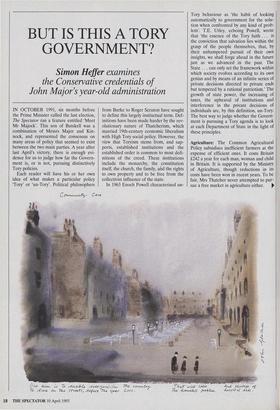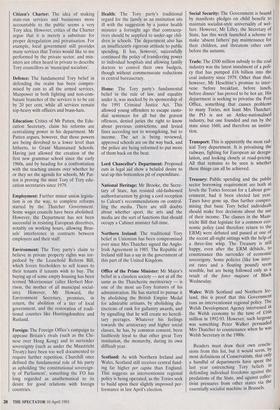BUT IS THIS A TORY GOVERNMENT?
Simon Helfer examines the Conservative credentials of John Major's year-old administration
IN OCTOBER 1991, six months before the Prime Minister called the last election, The Spectator ran a feature entitled 'Meet Mr Majock'. This son of Butskell was a combination of Messrs Major and Kin- flock, and represented the consensus on many areas of policy that seemed to exist between the two main parties. A year after last April's victory, there is enough evi- dence for us to judge how far the Govern- ment is, or is not, pursuing distinctively Tory policies.
Each reader will have his or her own idea of what makes a particular policy 'Tory' or `un-Tory'. Political philosophers from Burke to Roger Scruton have sought to define this largely instinctual term. Def- initions have been made harder by the rev- olutionary nature of Thatcherism, which married 19th-century economic liberalism with High Tory social policy. However, the view that Toryism stems from, and sup- ports, established institutions and the established order is common to most defi- nitions of the creed. These institutions include the monarchy, the constitution itself, the church, the family, and the rights to own property and to be free from the collectivist influence of the state.
In 1963 Enoch Powell characterised un- Tory behaviour as 'the habit of looking automatically to government for the solu- tion when confronted by any kind of prob- lem'. T.E. Utley, echoing Powell, wrote that 'the essence of the Tory faith. . . is the conviction that salvation lies within the grasp of the people themselves, that, by their unhampered pursuit of their own insights, we shall forge ahead in the future just as we advanced in the past. The State. . can only set the framework within which society evolves according to its own genius and by means of an infinite series of private decisions directed to private ends but tempered by a rational patriotism.' The growth of state power, the increasing of taxes, the upheaval of institutions and interference in the private decisions of individuals are, by this definition, un-Tory. The best way to judge whether the Govern- ment is pursuing a Tory agenda is to look at each Department of State in the light of these principles.
Agriculture: The Common Agricultural Policy subsidises inefficient farmers at the expense of efficient ones. It costs Britain £242 a year for each man, woman and child in Britain. It is supported by the Ministry of Agriculture, though reductions in its costs have been won in recent years. To be fair, Mrs Thatcher never attempted to pur- sue a free market in agriculture either.
Citizen's Charter: The idea of making state-run services and businesses more accountable to the public seems a very Tory idea. However, critics of the Charter argue that it is merely a substitute for proper deregulation and privatisation. For example, local government still provides many services that Tories would like to see performed by the private sector, and min- isters are often heard in private to describe Tory councillors as 'municipal socialists'.
Defence: The fundamental Tory belief in defending the realm has been compro- mised by cuts to all the armed services. Manpower in both fighting and non-com- batant branches of the services is to be cut by 20 per cent, while all services remain top-heavy with officers and brass-hats.
Education: Critics of Mr Patten, the Edu- cation Secretary, claim his reforms are centralising power in his department. Mr Patten argues, however, that those powers are being devolved to a lower level than hitherto, to Grant Maintained Schools. Having just allowed the creation of the first new grammar school since the early 1960s, and by heading for a confrontation with the teaching unions over whether he or they set the agenda for schools, Mr Pat- ten is proving the most Tory of Tory edu- cation secretaries since 1979.
Employment: Further minor union legisla- tion is on the way, to complete reforms started by the Thatcher Government. Some wages councils have been abolished. However, the Department has not been successful in resisting European directives, notably on working hours, allowing Brus- sels' interference in contracts between employers and their staff.
Environment: The Tory party's claim to believe in private property rights was tor- pedoed by the Leasehold Reform Bill, which forces freeholders to sell leases to their tenants if tenants wish to buy. The buying up of some empty housing has been termed `Morrisonian' (after Herbert Mor- rison, the mother of all municipal social- ists). However, Mr Howard, the Environment Secretary, promises, in return, the abolition of a tier of local government, and the restoration of tradi- tional counties like Huntingdonshire and Rutland.
Foreign: The Foreign Office's campaign to appease Britain's rivals (such as the Chi- nese over Hong Kong) and to surrender sovereignty (such as under the Maastricht Treaty) have been too well documented to require further repetition. Churchill once defined the fundamental role of his party as upholding 'the constitutional sovereign- ty of Parliament', something the FO has long regarded as anathematical to its desire for good relations with foreign countries. Health: The Tory party's traditional regard for the family as an institution sits ill with the suggestion by a junior health minister a fortnight ago that contracep- tives should be supplied to under-age chil- dren in schools. The department also has an insufficiently rigorous attitude to public spending. It has, however, successfully continued the policy of transferring power to individual hospitals and allowing family doctors to control their own budgets, though without commensurate reductions in central bureaucracy.
Home: The Tory party's fundamental belief in the rule of law, and equality under it, was mocked by its sponsorship of the 1991 Criminal Justice Act. This allowed young offenders to escape custo- dial sentences for all but the gravest offences, denied juries the right to know about previous convictions, and levied fines according not to wrongdoing, but to income. The act is being reviewed, approved schools are on the way back, and the police are being reformed to put more of them back on the beat.
Lord Chancellor's Department: Proposed cuts in legal aid show a belated desire to seal up this bottomless pit of expenditure.
National Heritage: Mr Brooke, the Secre- tary of State, has resisted old-fashioned authoritarianism by giving a cool reception to Calcutt's recommendations on control- ling the media. There are still doubts about whether sport, the arts and the media are the sort of functions that should occupy a Cabinet minister full-time.
Northern Ireland: The traditional Tory belief in Unionism has been compromised ever since Mrs Thatcher signed the Anglo- Irish Agreement in 1985. The Republic of Ireland still has a say in the government of this part of the United Kingdom.
Office of the Prime Minister: Mr Major's belief in a classless society — not at all the same as the Thatcherite meritocracy — is one of the most un-Tory features of his administration. He has started to pursue it by abolishing the British Empire Medal for admirable artisans, by abolishing dis- tinctions of rank for gallantry awards, and by signalling that he will create no heredi- tary peerages. Whatever his feelings towards the aristocracy and higher social classes, he has, by common consent, been faultlessly loyal to that other great Tory institution, the monarchy, during its own difficult year.
Scotland: As with Northern Ireland and Wales, Scotland still receives central fund- ing far higher per capita than England. This suggests an interventionist regional policy is being operated, as the Tories seek to build upon their slightly improved per- formance in last April's election.
Social Security: The Government is bound by manifesto pledges on child benefit to maintain socialist-style universality of wel- fare. However, Mr Lilley, the Secretary of State, has this week launched a scheme to make 'absent fathers' pay maintenance for their children, and threatens other cuts before the autumn.
Trade: The £500 million subsidy to the coal industry was the latest instalment of a poli- cy that has pumped £16 billion into the coal industry since 1979. Other than that, however, Mr Hese!tine's promise to inter- vene 'before breakfast, before lunch, before dinner' has proved to be hot air. His department is seeking to privatise the Post Office, something that causes problems to many Tories, not least Mrs Thatcher; the PO is not an Attlee-nationalised industry, but one founded and run by the state since 1660, and therefore an institu- tion.
Transport: This is apparently the most rad- ical Tory department. It is privatising the railways, fighting for European air deregu- lation, and looking closely at road-pricing. All that remains to be seen is whether these things can all be achieved.
Treasury: Public spending and the public sector borrowing requirement are both at levels the Tories forecast for a Labour gov- ernment, had it been elected last year. Taxes have gone up, thus further compro- mising that basic Tory belief individuals should make free decisions about the use of their income. The clauses in the Maas- tricht Bill that legislate for a common eco- nomic policy (and therefore return to the ERM) were debated and passed at one of the recent all-night sittings with the help of a three-line whip. The Treasury is still happy, even after the ERM debacle, to countenance this surrender of economic sovereignty. Some policies (like low inter- est rates and a floating pound) seem sensible, but are being followed only as a result of the force majeure of Black Wednesday.
Wales: With Scotland and Northern Ire- land, this is proof that this Government runs an interventionist regional policy. The Welsh Development Agency intervened in the Welsh economy to the tune of £166 million in 1992-93. However, such largesse was something Peter Walker persuaded Mrs Thatcher to countenance when he was Welsh Secretary in the 1980s.
Readers must draw their own conclu- sions from this list, but it would seem, by most definitions of Conservatism, that only a handful of departments have spent the last year entrenching Tory beliefs In defending individual freedoms against the predations of the State, and against collec- tivist pressures from other states via the essentially socialist machine in Brussels.



























































 Previous page
Previous page